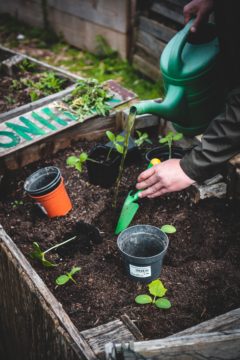by Rebecca Baumgartner

Parenting is one of the domains where certain people scoff at the idea that reading a book or article could possibly be helpful. “That’s nice and all,” the complaint goes, “but when it comes to real life, all those ideal scenarios fly out the window.” The other group of parents, the ones who gobble up data and theories about child development, feel that any tool or strategy that gets us closer to being the parent we want to be is worth investigating.
I have fallen into both camps at various times, and I have found it largely depends on the writing skill of the author and the explanatory power of their ideas – but most of all, whether they offer anything genuinely new or perspective-shifting that I couldn’t have figured out on my own amidst the grunt work of being a parent.
A recent NPR article encapsulates the rising industry of telling us what we already know under a trendy label and repackaging common sense as something newsworthy. Starting with the headline of the article – “The 5-minute daily playtime ritual that can get your kids to listen better” – we are already off to a bad start.
The article discusses the concept of “special time,” which is open-ended playtime where the parent is not telling the child what to do for at least five minutes. This approach is described as a “counterintuitive” concept invented by a specific researcher in the 1970s. It turns out that if you listen to your kid, engage with them as a person, aren’t always barking commands at them, and play with them in a way they find satisfying, they will – wait for it – like you better and be more willing to listen to you. Perhaps shockingly to the researchers, this is solid advice for dealing with pretty much all humans, despite their claim that “the practice often feels awkward for adults at first.”
It’s not entirely clear why NPR is presenting research from the 1970s as newsworthy today, but the assumption is that parents are fed up with trying to control their demonic offspring and would not have considered actually sitting down on the floor with their kid and taking an interest in what they like to do, were it not for NPR telling us to do so. There is something deeply sad about the idea that we need to be reminded that our children are people with inner lives who do not merely exist to obey us, and that everyone in the household will be happier if we treat them as such.

The content of the article itself not only points out the general state of the parenting advice industry (which I would summarize as “always be optimizing”), but it also highlights the balance we all try to find between being and doing, and what happens when we treat childrearing as an item on a to-do list and not an interaction with a human being. (This can in turn make us realize all the ways that we live our lives – whether we have children or not – wanting to skip the commercials of life and get to the “good stuff.” In actuality, as John Lennon put it, “Life is what happens to you when you’re busy making other plans.”)
But what stood out most to me was the following line in the article: “Keep these directives in mind as you play with your child.” Every cell in my body screams “No!” when I read that. There are no directives during play! How insulting to presume that any reasonably competent parent needs a checklist of “directives” in order to bond with their child! How counterproductive to dictate that rather than living in the moment they should be thinking about these “directives”! How small-minded to believe that the process of creating a unique, vibrant, and life-enhancing bond between two people can be reduced to a hokey acronym!
“Show enthusiasm while playing with your child by smiling, clapping or using your words to express you’re having a good time,” the article recommends. One photo is captioned, “Harlan claps as August plays to show him that she’s having a good time.” Are these instructions from the Voyager spacecraft intended to explain to alien lifeforms how earthlings interact?

And don’t let the child do anything rough or messy or overly complicated, the authors advise. The goal is to let the kid call the shots, but let’s not go crazy and literally do the activity they want to do. We wouldn’t want the five-minute special time directives to get out of hand and actually turn into something fun. And it’s important to note that special time is only for children ages 2 to 7. Once that kiddo hits 7, you can go back to barking commands at them and taking no interest in their lives, like you were presumably doing before reading the article.
What makes the NPR piece so frustrating is that there are ideas of real value surrounding these oversimplifications. One of my favorites is Alison Gopnik’s metaphor in her 2016 book The Gardener and the Carpenter. The difference between the two types is that “carpenter” parents try to shape their child with a particular outcome in mind, whereas “gardener” parents create a nurturing environment and then see what happens. It’s a beautiful book that elucidates all of the important ways that gardener parents end up with happier families, despite not trying for any particular outcome. Gopnik’s ideas recognize the value of the spontaneous, deeply tuned-in nature of authentic parent-child connections, free of the need to control the experience.

There is an interesting connection between parents of each type and the drive to work toward pre-determined goals such as the ones in the “special time” article. Naturally, carpenter parents love having directives to follow, and this is core to the “always be optimizing” parenting mindset, too. Bonding with the child is viewed as a means to an end – getting the kid to listen to you or improve in some other domain – rather than a chance to observe and let something, possibly something unexpected, grow organically from the interaction.
In an interview in 2018 (ironically with NPR), Gopnik reflected on this:
[Starting in the 20th century], people were having children who hadn’t had much experience of caring for children but had lots of experience of going to school and working. It was kind of natural for people to think, “OK, this is like going to school and working. And if I can just find the right manual or the right secret handbook, I’m going to succeed at this task the same way that I succeeded in my classes or I succeeded at my job.”
The Book You Wish Your Parents Had Read by Philippa Perry (2019) is another non-patronizing and genuinely insightful book that demonstrates the value of getting to know our children as individuals and connecting with them authentically, even into adulthood, without ulterior motives or feeling the need to impose our agenda on them. Perry’s ideas are part of the same gardener-parent universe where the focus is on nurturing a human being, not completing a task or advancing toward a specific goal.
Taking a step back from parenting, there are many other aspects of life – usually ones that are more difficult to absorb into capitalism, like sleep – that savvy authors have re-framed in a very “carpenter” sort of way. They see these areas as a prime opportunity to sell you what you already know by packaging it in pretty book covers and inventing trendy labels: think of things like happiness research, digital detoxes, fitness trackers, sleep hygiene routines, and the self-care craze. I rebel at the attempt of these authors to turn our lives into a series of projects that colonize our periods of rest, spontaneity, connection, and care.

Instead of creating articles purporting to teach us what clapping means, we can just sit down and ask our kid what they want to play. Instead of reading the thousandth book about developing a self-care routine, we can simply rest and take care of ourselves. Instead of counting our steps, we can look at the trees we’re walking past. Instead of looking outward for checklists and guidelines, we can see what is needed in each moment and tune in to those around us. We already know what we need.
